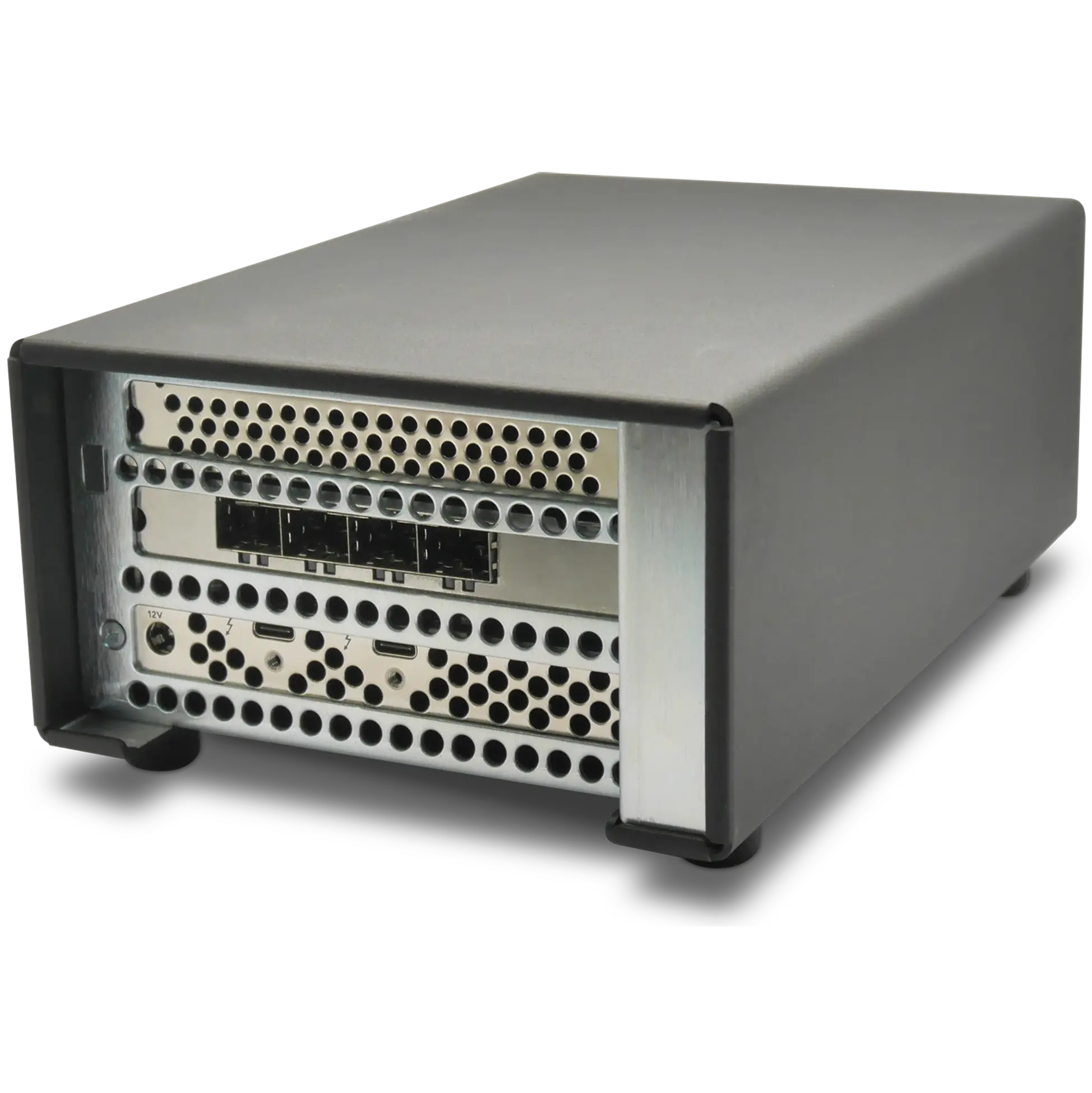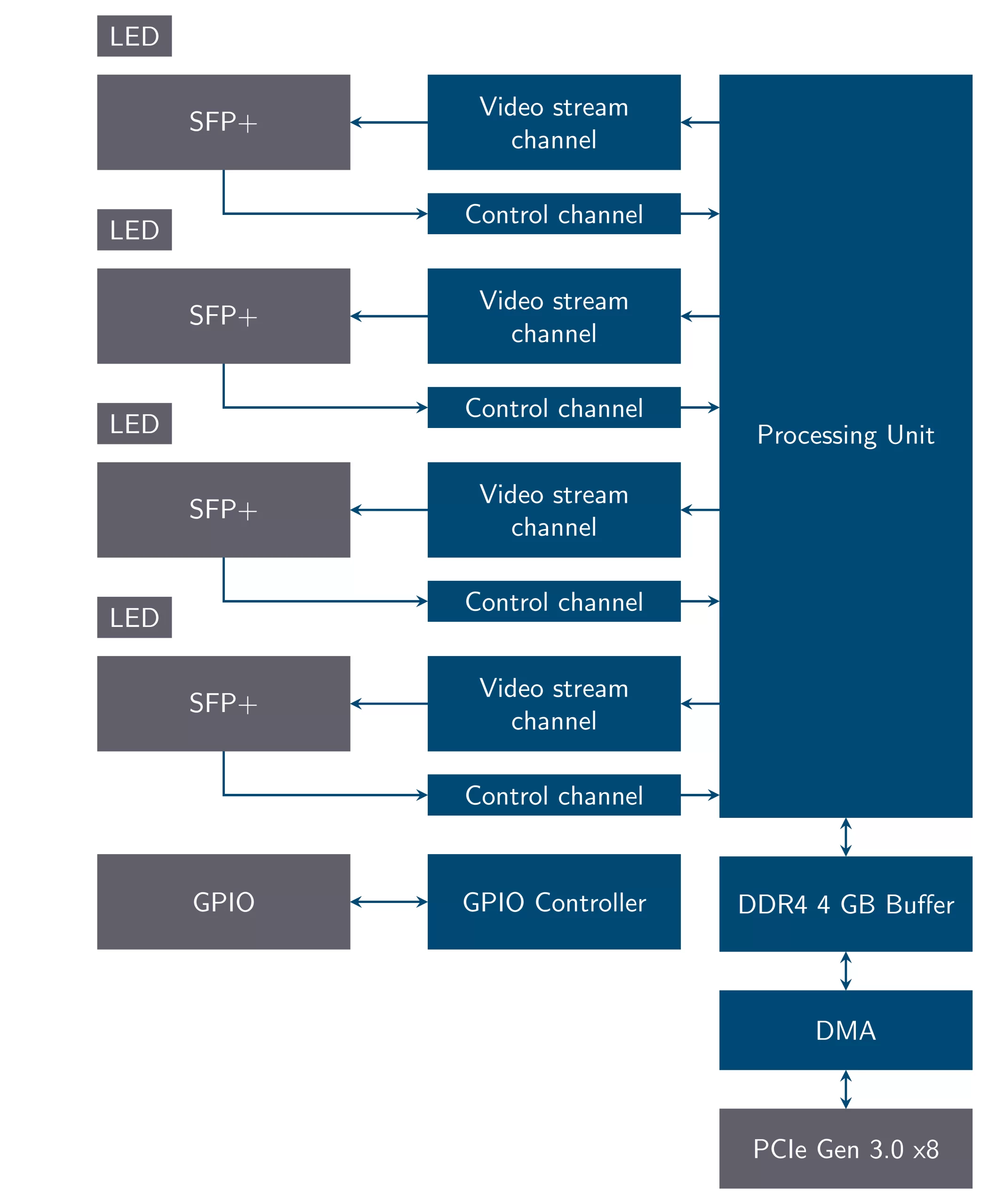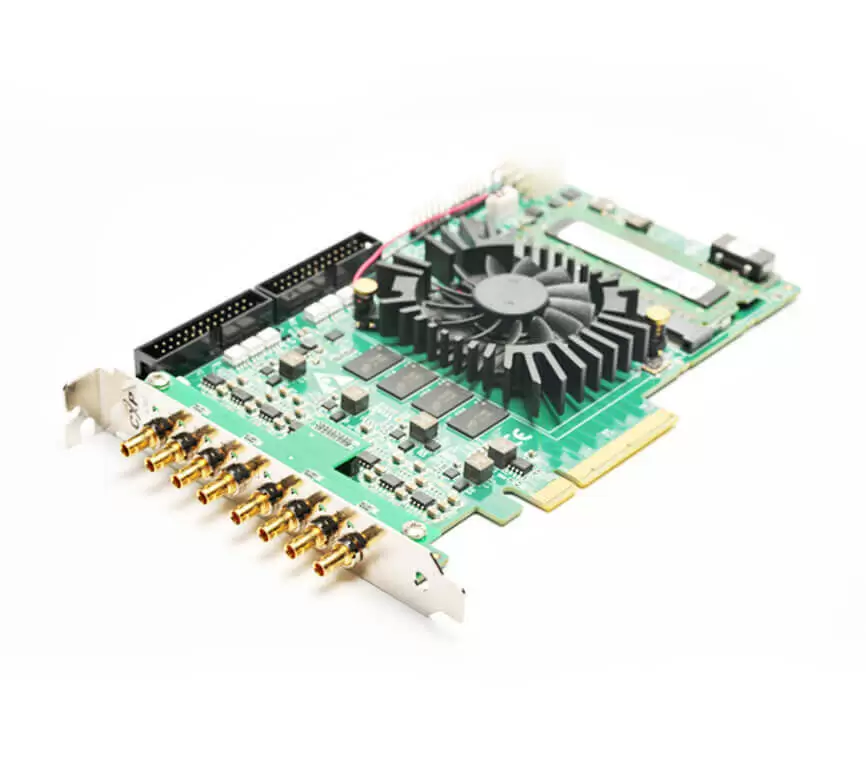
Chameleon II CoaXPress over Fiber Stand Alone Camera Simulator
Features
• Static and dynamic test patterns
• BMP/RAW/TIFF/JPEG etc. image files
• RAW video files
• Streaming video 3,347 MB/s
• Data rates up to 15.9375 Gbps per link
• Up to 32 Gbyte image buffer
• Multiple pre-recorded video in sequential/loop modes
• Fully programmable image timing
• Fully programmable configuration parameters
• Emulation of Camera controls and triggers
• GUI Interface
• Up to 4 CoaXPress-over-Fiber (Cof) links support
• Frame and line scan formats support
• Flexible GPIO interface:
– 4 TTL configurable I/Os
– 4 LVTTL configurable I/Os
– 2 LVDS inputs
– 2 LVDS outputs
– 4 opto-isolated inputs
– 4 opto-isolated outputs
– 4 quadrature rotary encoders
– Integrated strobe controller
– 4 timers
• CoaXPress-over-Fiber (Cof) v2.1 compliant
• Gen<i>Cam compliant
• Supporting Windows, Linux OS and Nvidia Jetpack
• API for custom application development
• Plug-in modules for Matlab, HALCON, Cognex and
Labview
• SFP+ connectors for CoaXPress-over-Fiber (Cof)
links
• External Thunderbolt 3 enclosure
• Per-Link LED indication
• 0°C to +50°C operating environment temperatures
April, 2024 www.kayainstruments.com
Chameleon II CoF Standalone is the industry’s first
CoaXPress-over-Fiber (Cof) v2.1 standard camera
simulator. Capable of generating video streams and test
patterns of up to 4 links in single, dual or quad modes. With
each link supports standard CoaXPress-over-Fiber (Cof)
v2.1 bitrates of up to 15.9375 Gbps. With a grand total PCI
Express transfer rate of up to 3,347 MB/s, the Chameleon
II CoF Standalone is ideally suited for development of
industrial, defense and aerospace Machine Vision systems
and applications
The Chameleon II CoF Standalone can easily transmit
generic test patterns, customers specific pre-processed
data or custom video streams on the CoaXPress-over-Fiber
(Cof) v2.1 links. A GPIO connector enables machine
control signals such as triggers, timers, shaft-encoders,
exposure-control and general I/O along with video stream
acquisition. Standard SFP+ and headers connector are
used as the CoaXPress-over-Fiber (Cof) v2.1 interface and
the general purpose I/O, respectively.
Specifications
| Mechanical | |
| Form factor | Thunderbolt 3 enclosure |
| Format | External Thunderbolt 3 enclosure |
| Cooling method | Fan cooled |
| Mounting | Stand Alone |
| Connectors | Ports 1 through 4 via x4 SFP+ connectors for CoaXPress-over-Fiber (Cof) v2.1 interface |
| x1 I/O connector 26-pin 2-row 0.1” pitch pin header with shrouding on board | |
| Dimensions | 220 mm x 143 mm x 89 mm (8.7” x 5.6” x 3.5”) |
| Weight | 1500 g (52.9 oz) |
| Host Bus | |
| Standard | PCI Express 3.0 |
| Link width | 4 lanes |
| 1 or 2 lanes with reduced performance | |
| Link speed | 8.0 GT/s (PCIe 3.0) |
| 5.0 GT/s (PCIe 2.0) with reduced performance | |
| Maximum payload size | 2,048 bytes |
| DMA | 64-bit addressing support |
| Scatter gather support | |
| Physical address support (GPU transfers) | |
| Peak delivery bandwidth | 3,938 MB/s |
| Effective (sustained) delivery bandwidth | 3,347 MB/s (Host PC dependent) |
| Power consumption | 16.8 W, excluding camera and I/O power output |
| Camera / Video Simulation | |
| Interface standard(s) | CoaXPress-over-Fiber (Cof) v2.1 |
| Status LEDs | 1 bicolor status LED per connector |
| 4 System status LEDs | |
| Number of Simulated cameras | 1 |
| Number of links per single camera | Up to 4 |
| Number of streams per single camera | 1 |
| Synchronization between simulators | Yes |
| Line-scan cameras supported | Yes |
| Maximum aggregated camera data transfer rate | 63.8 Gbit/s |
| Supported down-connection speeds | • 10.3 Gbit/s • 12.5 Gbit/s • 13.75 Gbit/s • 15.9375 Gbit/s |
| Supported up-connection speeds | • 10.3 Gbit/s • 12.5 Gbit/s • 13.75 Gbit/s • 15.9375 Gbit/s |
| Maximum stream packet size | 8,192 bytes |
| Power over protocol | |
| Bandwidth limitations | 8 bpp, 12 bpp, 14 bpp, 16 bpp – 40 Gbps protocol limited |
| 10 bpp – 34 Gbps | |
| Image width | 16 pixel to 16 Megapixels |
| Image height | 1 pixel to 16 Megapixels |
| Arbitrary image simulation | Not supported |
| Link Sharing | Images must be striped prior to loading to API or APP |
| Camera types | Area-scan cameras: |
| Gray-scale and color (RGB and Bayer CFA) | |
| Single-tap (1X-1Y) progressive-scan | |
| Multi tap images can be simulated with API and user image segmentation | |
| Line-scan cameras: | |
| Gray-scale and color RGB | |
| Camera pixel formats supported | Raw, Monochrome, Bayer, RGB, YUV, YCbCr and RGBA (PFNC names): |
| Raw (Without headers) | |
| Mono8, Mono10, Mono12, Mono14, Mono16 | |
| BayerXX8, BayerXX10, BayerXX12, BayerXX14, BayerXX16 where XX = GR, RG, GB, or BG | |
| RGB8, RGB10, RGB12, RGB14, RGB16 | |
| RGBA8, RGBA10, RGBA12, RGBA14, RGBA16 | |
| YUV422_8, YUV422_16 | |
| YUV444_8, YUV444_10, YUV444_12,YUV444_14, YUV444_16 | |
| YCbCr601_422_8, YCbCr601_422_10, YCbCr601_422_12, YCbCr601_422_14, YCbCr601_422_16 | |
| YCbCr709_422_8, YCbCr709_422_10, YCbCr709_422_12, YCbCr709_422_14, YCbCr709_422_16 | |
| YCbCr709_444_8, YCbCr709_444_16 | |
| Camera / Video Simulation | |
| Status LEDs | 1 bicolor status LED per camera connector
4 System status LEDs |
| Number of cameras | 1 |
| Number of links per single camera | Up to 4 |
| Number of streams per single camera |
1 |
| Synchronization between cameras | Yes |
| Single-tap (1X-1Y) interlaced | |
| Raw | |
| YUV411_8, YUV411_10, YUV411_12, YUV411_14, YUV411_16 | |
| YUV422_8, YUV422_10, YUV422_12, YUV422_14, YUV422_16 | |
| YUV444_8, YUV444_10, YUV444_12, YUV444_14, YUV444_16 | |
| YCbCr601_411_8, YCbCr601_411_10, YCbCr601_411_12, YCbCr601_411_14, YCbCr601_411_16 | |
| YCbCr601_422_8, YCbCr601_422_10, YCbCr601_422_12, YCbCr601_422_14,YCbCr601_422_16 | |
| YCbCr601_444_8, YCbCr601_444_10, YCbCr601_444_12, YCbCr601_444_14, YCbCr601_444_16 | |
| General Purpose Inputs and Outputs | |
| Number of lines | 20 I/O lines: |
| 2 differential inputs | |
| 2 differential outputs | |
| 4 singled-ended TTL inputs/outputs | |
| 4 singled-ended LVTTL inputs/outputs | |
| 4 opto-isolated inputs] | |
| 4 opto-isolated outputs | |
| Usage | Any System I/O input lines can be connected to any I/O output line |
| Any I/O input line can be used to decode A/B and Z signals of a motion encoder | |
| Any I/O input line can generate any trigger event | |
| Any I/O input line can trigger a timer | |
| Electrical specifications | Differential lines – LVDS compatible |
| TTL lines: 5 V TTL compliant | |
| LVTTL lines: 3.3 V LVTTL compliant | |
| Isolated lines: opto-isolated lines with voltage range up to 30 V | |
| Filter control | Glitch removal filter for Encoders and Triggers |
| Configurable filter time between 0 µs and 34 ms | |
| Filter time resolution of 8 ns | |
| Polarity control | Yes |
| Encoders | 4 quadrature encoders with A/B and Z inputs |
| 32-bit position counter | |
| Forward and backward counting | |
| Position trigger support | |
| Noise filtering | |
| Timers | 4 general purpose timers |
| Configurable delay and duration | |
| 32-bit accumulator | |
| Event reporting | 64-bit system timestamp event reporting |
| Each I/O line can generate event on configurable edge | |
| Each Timer can generate event | |
| Each encoder can generate event | |
| Area-Scan Camera Control | |
| Trigger | Precise control of asynchronous reset cameras, with exposure control. |
| Support of camera exposure/readout overlap | |
| Support of triggering from encoder or timer | |
| Support of external hardware trigger, with optional delay, filtering and trigger decimation | |
| Strobe | Accurate control of the strobe position for strobe light sources. Support of early and late strobe pulses |
| On-Board Processing | |
| On-board memory | 4 GB DDR4 |
| Additional features | Packing of 16-bit LSB aligned to 10/12/14-bit |
| Data stream statistics | Measurement of: |
| Frame rate | |
| CRC Errors | |
| Transmit frames | |
| Transmit packets | |
| Test packets | |
| Event signaling and counting | The application software can be notified of the occurrence of various events: |
| Newly acquired buffers | |
| I/O events | |
| Timer events | |
| Encoder events | |
| Bayer De-Mosaic | Full 16-bit resolution |
| Bilinear 3×3 | |
| Bilinear 3×2 for linescan with gradient correction | |
| Color transformation | Full 16-bit resolution 18-bit coefficients table |
| Color space conversion | |
| Gain and Offset | |
| Decimation | Line skip |
| Additional features | Unpacking of 10/12/14-bit to 16-bit LSB aligned |
| Frame timestamp | 64-bit with 8 ns precision |
| Received/Dropped frames | |
| Received/Dropped packets | |
| Software | |
| Host PC operating system | Microsoft Windows 10 64-bit version |
| Microsoft Windows 11 64-bit version | |
| Signed and certified kernel driver supporting Windows 10 and 11 | |
| Source code Linux kernel driver (Automaticlly compiled during installation) | |
| Tested for Ubuntu 18.04, 20.04 and 22.04 versions | |
| Nvidia Xavier AGX (Jetpack 5.1.1 and 4.6.1) | |
| Nvidia Orin AGX (Jetpack 5.1.1) | |
| Gen<i>Cam | Support of Gen<i>Cam 3.2 |
| Full camera and Frame Grabber parameters configuration | |
| Buffer management | Circular buffer support |
| Accumulation of several frames/lines to single buffer to reduce CPU load | |
| Flexible buffer queuing | |
| DMA Buffer filling directly to system memory | |
| GUI | Supported for Windows and Linux OS |
| Multi camera display and configuration | |
| Image/video recording and playback | |
| Debugging capabilities | Event logging |
| Statistics counters | |
| APIs | Gen<i>Cam, GenTL producer libraries, ANSI C, Python and NET bindings |
| x86_64 dynamic library designed to be used with ISO-compliant C runtime | |
| Allows for development of x86_64 applications | |
| Plug-in modules for Matlab, HALCON, Cognex and Labview | |
| Export straightforward, unified and easy-to-use API across all Grabber types | |
| Include practical examples based on API functions, for supported language wrappers | |
| Documentation include sample snippets for API usage | |
| Environmental Conditions | |
| Operating ambient air temperature | 0°C to +50°C ( 32°F to +122°F) |
| Operating ambient air humidity | 10 Storage ambient air temperature |
| Storage ambient air humidity | 10 Shock/Vibration |
| Certifications | |
| Electromagnetic – EMC standards | The European Council EMC Directive 2004/108/EC |
| The Unites States FCC rule 47 CFR 15 | |
| EMC – Emission | EN 55022:2010 Class B |
| FCC 47 Part 15 Class B | |
| EMC – Immunity | EN 55024:2010 Class B |
| EN 61000-4-3 | |
| EN 61000-4-4 | |
| EN 61000-4-6 | |
| Flammability | PCB compliant with UL 94 V-0 |
| RoHS | Compliant with the European Union Directive 2011/65/EU (RoHS2) |
| REACH | Compliant with the European Union Regulation No 1907/2006 |
| WEEE | Must be disposed of separately from normal household waste and must be recycled according to local regulations |
| Ordering Information | |
| Part Number | KY-Chameleon-II-COF-SA |
| Optional accessories | SFP+ modules |
| Fiber cables | |
| GPIO expansion bracket | |
Block diagram

Deliverables
- CoF Camera Simulator
- Hardware user manual
- Power supply (optional)
- Fiber cables (optional)





